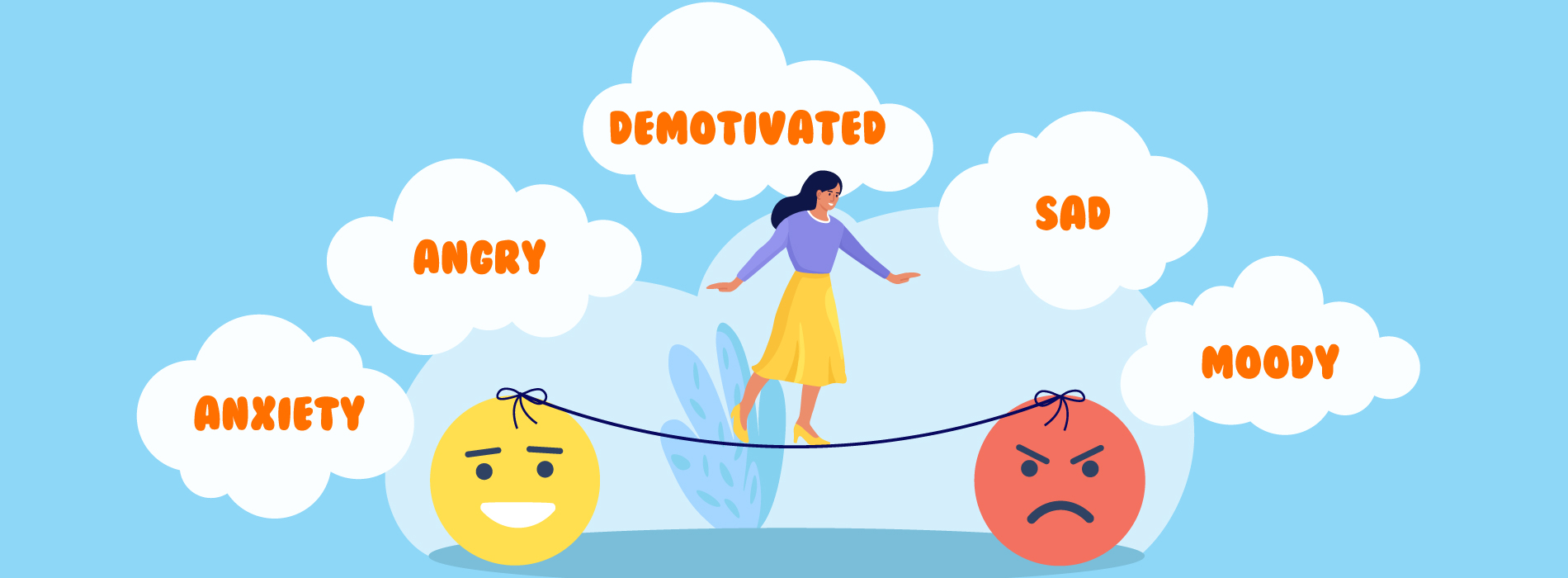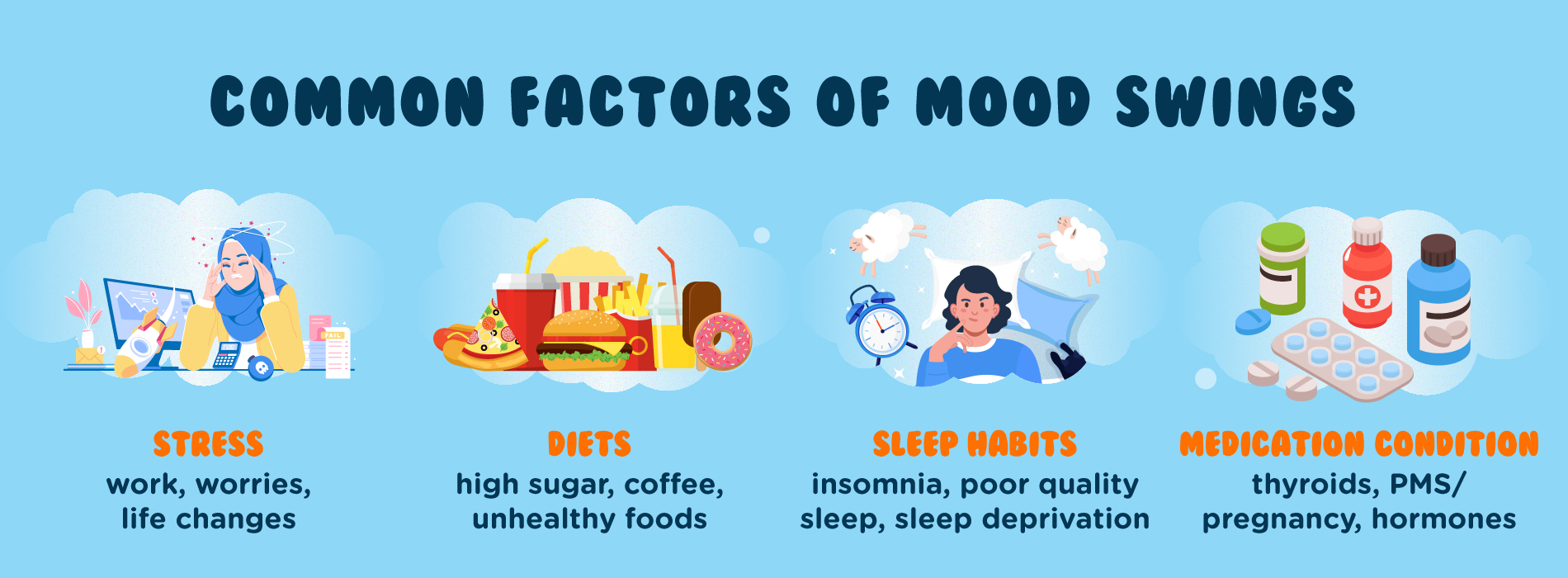How to Manage Mood Swings?

It is normal to have good and bad days but it is up to us to learn how to cope with it the best ways possible.
A mood swing is a fast, significant change in mood or emotional state and often relates to a roller coaster of emotions[1]. You can be happy one moment and be irritable or angry the very next minute. It’s not uncommon since everyone has their good and bad days, which are a natural part of life for most people.
What causes mood swings?
Everyone experiences mood swings from time to time and the frequency of them could be signs of these underlying factors:

Stress and lifestyles: When you are going through life changes either relationship breakups; stress and worries regarding school or work; and moving can sometimes cause enough stress to trigger mood swings. What’s worse about these factors is that they can potentially affect your sleep quality, further leading to insomnia and sleep deprivation.
Hormonal: Hormonal shifts can lead to significant changes in mood especially during menstruation, pregnancy and menopause for females. Patients who have thyroid issues are prone to mood swings as well regardless of gender.
Diets: Each individual reacts to food differently from another individual. Some may experience a sudden change of mood after eating refined carbohydrates such as bread, pastries and white rice as well as after drinking a cup of coffee.
Ways to elevate your mood!
Mood swings can be challenging, especially if they interfere with your day-to-day life. Try making some positive changes in your lifestyle to see how much of a difference they can make in your life.
1. Get Sufficient Sleep
It is common for us to sacrifice sleep so that we can watch an extra episode of our favourite show or have supper with friends late at night. Though it’s all fun and games, it’s undeniable that sleep deprivation can do more harm than good.
Sleep is important for restoring daily functioning so lacking hours of sleep can result in being more emotional and sensitive to stressful stimuli[2]. As a result, lack of sleep at night can make you easily irritable the next day. Over time, long-term sleep deficiency can also mess up more than just your morning mood and potentially increase the risks of chronic health problems as well as mood disorders.
In fact, lack of sleep and being cranky are closely linked and they can work both ways. Sleep loss can affect your mood and your mood can affect how much and well you sleep[3]. Adults are recommended to get at least 7-8 hours of sleep daily for the brain to process their emotions in their sleep, thus increasing positive reactions and reducing negative moods[4].
2. Set Daily Goals For Success
Most of us have big goals that we wish to achieve throughout our lifetime, whether it’s our personal life, career, health or finances. The process of reaching those goals can be tough and demanding which may lead you to lose motivation and passion along the way. Perhaps, we can look into breaking it down by setting smaller daily goals that would help us to reach those goals. That way, ticking the boxes off your daily goals could increase your sense of achievement which allows you to stay motivated.
First, identify the goals that you would like to achieve then create a list of daily achievable goals that are aligned with your short and long-term priorities. This will allow you to stay on track by accomplishing the current tasks while making tiny progress towards your goals. Having daily goals would help prioritise your time on what’s important, be productive and also celebrate day-to-day accomplishments. It is said that setting goals could boost self-confidence and increase productivity as the process creates a clear purpose for action[5].
3. Eat a Balanced Diet
What you eat doesn’t only play a vital role in your health but also holds a high influence on your mood. Unhealthy eating patterns and types of food can cause mood swings. This is a result of blood sugar fluctuation and nutritional imbalance in the body, causing the body to react and trigger mood shifts[6].
Incorporating healthy food options to your meal will not only control your waistline but also lift your mood as well as provide a long-lasting boost of energy and focus. Some examples of healthy foods are berries, beans, fish, vegetables, fruits and dark chocolate. Stick to nutrient-rich food to fuel your body so that you can feed your mind with good thoughts.
In addition, you can consider supplements containing herbal extracts like ashwagandha, chamomile, lemon balm, green tea, and jujube seed as they help with relaxation and improve quality sleep. It is especially beneficial for those who are coping with demanding lifestyles and stressful environments.
4. Exercise Regularly
It is no surprise to all that exercise is important in keeping our bodies healthy. But did you know that exercise also keeps you mentally healthy? Exercise improves mental health by reducing anxiety, depression, and negative mood[7]. This could be explained by the body releasing endorphins when you exercise and sending a message to your brain that triggers a positive mindset and energising outlook in life, ultimately enhancing your mood.
So, remember doing low to moderate exercises of about 2.5 – 5 hours per week is enough to make a difference in your mood[8]. Moreover, physical activity can be an outlet for your frustrations and a good stress reliever.
Disclaimer – All content provided is for educational purposes only, thus the information presented here is not a substitute for any professional advice. Kindly consult a professional if needed.
[1] https://psychcentral.com/lib/all-about-mood-swings#1
[2] https://www.ncbi.nlm.nih.gov/pmc/articles/PMC7181893/
[3] https://www.betterhealth.vic.gov.au/health/healthyliving/Mood-and-sleep
[4] https://www.webmd.com/sleep-disorders/benefits-sleep-more
[5] https://www.psychologytoday.com/us/blog/the-moment-youth/201803/goal-setting-is-linked-higher-achievement
[6] https://www.mentalhealthfirstaid.org/external/2018/03/relationship-food-mood/
[7] https://www.ncbi.nlm.nih.gov/pmc/articles/PMC1470658/
[8] https://www.betterhealth.vic.gov.au/health/healthyliving/exercise-and-mental-health








